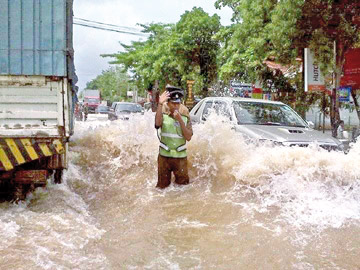Sri Lanka makes compensation plea in UN climate pledge
by Alex Pashley
The brute force of the ocean is etched in Sri Lanka's modern history.
In 2004, a calamitous tsunami killed an estimated 36,000 people as
30-metre high walls of water lashed its low-lying coastal plains.
Triggered by an earthquake near the Indonesian island of Sumatra,
that can't be blamed on climate change. But it underlined the country's
vulnerability to natural disasters, some of which will be stoked by
warming temperatures in future. That concern suffuses a seven-page
document delivered to the UN on Thursday (22).
 "Sri Lanka is largely affected by climate induced extreme weather
events and slow onset disasters," read its national contribution to a
global warming treaty due to be finalized in December. "Sri Lanka is largely affected by climate induced extreme weather
events and slow onset disasters," read its national contribution to a
global warming treaty due to be finalized in December.
"Losses and damage (L and D) due to these disaster events are heavy,
creating a huge pressure on the economy and public spending."
Government disaster relief stood at US$130 million between 2007 and
2011. Officials fear the bill could grow as global warming makes intense
storms or failed monsoons more likely.
Sea-level rise menaces Sri Lanka's tourism and fishing industries,
and the export of agricultural produce, the document warned.
Some threats can be reduced with investment in sea defences or
drought-resistant crops, for example. Officials calculate $420 million
is needed for climate-proofing over the next decade. Yet inevitably,
there will be impacts people cannot adapt to. Sri Lanka is rallying with
its low-lying cousins to force climate change's wealthy culprits to pay
out damages.
For the developing country of 20 million people, which emits just
0.1% of global greenhouse gas emissions, it is a matter of fairness.
"Sri Lanka intends to join hands to develop a fully-fledged Warsaw
International Mechanism on Loss and Damage to address the loss and
damage issues and in parallel develop an appropriate local mechanism,"
reads a highlighted box in the climate pledge, or INDC in UN lingo.
That is a tall order. Rich countries have pushed back on the vexed
issue, worried they would be opened up to a litany of lawsuits. Analysts
forecast that "loss and damage" will get just a fleeting mention in a
new climate agreement. Envoys from 195 nations are crafting a new global
warming treaty to be finalized in Paris in December. National pledges
form the backbone of the deal.
Sri Lanka's plan outlines greenhouse gas cuts to play its part.
It plans to shave 7% off forecasts of future emissions in 2030. That
can rise to 23% with help from international partners.
While its energy demand is on track to double within 20 years, it
said it will tackle a dirty transport system which belches half of the
energy sector emissions.
It plans greener vehicles, enhancing its public transport system and
laying electric railways. Biodiverse rainforest and mangroves, which
cover 30% of the country, will be increased to 32% to act as carbon
sinks.
- climatechangenews |

